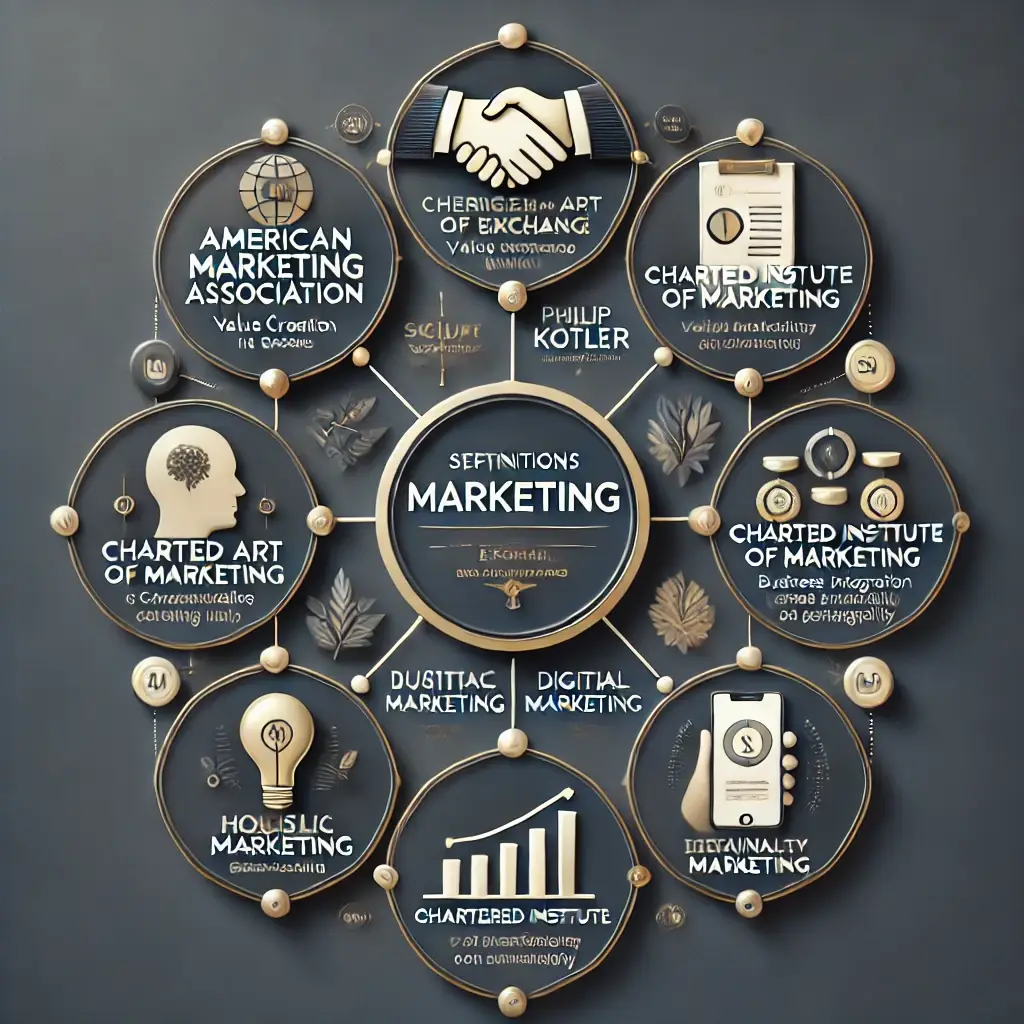Definition of Marketing: A Multi-Perspective Approach
Marketing is a broad and evolving discipline that encompasses various activities, strategies, and principles aimed at creating, communicating, and delivering value to consumers and businesses. Over time, scholars, institutions, and industry experts have provided multiple definitions of marketing, reflecting its dynamic nature. Below are some of the most widely accepted definitions of marketing, each offering a unique perspective.
1. The American Marketing Association (AMA) Definition
“Marketing is the activity, set of institutions, and processes for creating, communicating, delivering, and exchanging offerings that have value for customers, clients, partners, and society at large.”
(American Marketing Association, 2017)
Key Insights:
- Emphasizes marketing as a process that involves multiple stakeholders.
- Highlights value creation and exchange.
- Recognizes marketing’s impact beyond just businesses, extending to society.
2. Philip Kotler’s Definition
“Marketing is the science and art of exploring, creating, and delivering value to satisfy the needs of a target market at a profit. Marketing identifies unfulfilled needs and desires. It defines, measures, and quantifies the size of the identified market and the potential profit.”
(Kotler, 2012)
Key Insights:
- Blends analytical (science) and creative (art) aspects.
- Focuses on understanding and fulfilling customer needs.
- Ties marketing success to profitability and measurable impact.
3. Chartered Institute of Marketing (CIM) Definition
“Marketing is the management process responsible for identifying, anticipating, and satisfying customer requirements profitably.”
(CIM, UK)
Key Insights:
- Positions marketing as a management function.
- Stresses the proactive nature of marketing—identifying and anticipating needs.
- Links marketing directly to profitability.
4. The Holistic Marketing Definition
“Marketing is a strategy-driven process that integrates internal and external business functions to create value for consumers, ensuring long-term relationships and sustainable business growth.”
(Holistic Marketing Perspective, 21st Century)
Key Insights:
- Emphasizes integration across all business functions.
- Stresses sustainability and long-term relationships.
- Aligns with modern trends like corporate social responsibility (CSR) and ethical marketing.
5. The Digital-Age Marketing Definition
“Marketing is the use of digital channels, data-driven strategies, and interactive engagement to create personalized customer experiences, drive brand awareness, and build long-term loyalty.”
(Modern Digital Marketing Approach)
Key Insights:
- Acknowledges the rise of digital platforms (social media, SEO, content marketing).
- Focuses on personalization and data-driven decisions.
- Emphasizes customer engagement beyond traditional advertising.
Comparative Analysis of Marketing Definitions
| Definition Source | Focus Area | Strengths |
|---|---|---|
| AMA (2017) | Value creation & exchange | Recognizes marketing’s societal role |
| Kotler (2012) | Needs, value, profitability | Balances analytical and creative aspects |
| CIM (UK) | Process & profitability | Emphasizes anticipation of customer needs |
| Holistic Marketing | Business integration | Aligns marketing with sustainability |
| Digital-Age Marketing | Technology & engagement | Reflects modern marketing trends |
Conclusion
Marketing is a multifaceted discipline with evolving definitions that reflect changes in consumer behavior, technology, and global markets. Whether viewed from a strategic, economic, or technological perspective, marketing consistently revolves around understanding customer needs, delivering value, and building long-term relationships. As the field continues to grow, marketing definitions will likely adapt to new business models, digital transformations, and social responsibilities.

